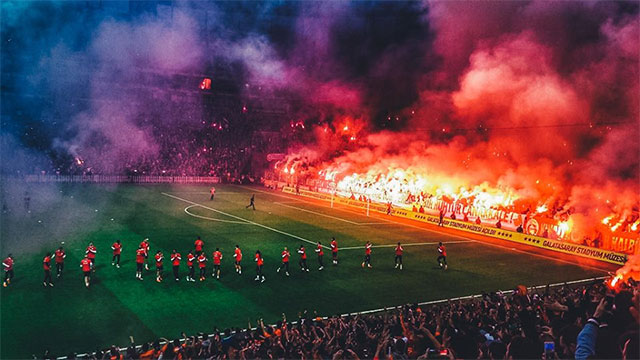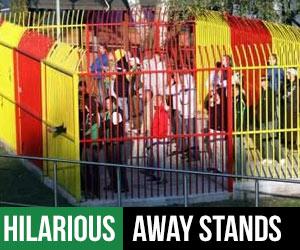Want to buy pyrotechnics? Visit pyro.ultras-tifo.net

Turkish football's descent into chaos grips 85 million fans. The Super Lig faces unprecedented turmoil, from referee assaults to club boycotts. This volatile mix of passion and politics demands scrutiny. As controversies unfold, Turkish football's future hangs in the balance. Strong tips for today from experts and even TipsGG football predictions suggest imminent, dramatic changes.
Turkish football's recent turmoil has shocked the nation. The assault on referee Halil Umut Meler by MKE Ankaragucu's president Faruk Koca led to an indefinite Super Lig suspension on December 11, 2023. This incident epitomized the sport's volatile atmosphere, with major clubs embroiled in controversies. Leagues resumed on December 20, introducing measures to respect officials, including pre-match flower presentations. The drama escalated when Istanbulspor's president withdrew his team mid-match against Trabzonspor, protesting a refereeing decision. These events highlight deep-rooted issues in Turkish football, reflecting broader societal tensions and tipsgg football predictions of ongoing upheaval.
Fenerbahçe's Grievances and Potential Super Lig Exit
Fenerbahçe's discontent with Turkish football has reached a critical point, highlighted by a scathing club statement detailing perceived injustices spanning two decades. The 19-time Super Lig champions are contemplating an unprecedented exit from the league, citing systematic bias. Their grievances encompass questionable refereeing decisions and match-fixing allegations. Fenerbahçe's leadership points to specific instances of unfair play, including controversial red cards and disputed penalties. The potential departure of such a prominent club would significantly impact Turkish football, underscoring the urgent need for reform. This stance reflects a deeper crisis of confidence in the sport's governance, threatening the competitive integrity of Turkish football. As tensions escalate, the situation demands immediate attention to prevent further deterioration of the league's credibility and appeal.
Turkish Super Cup Controversy: Delayed and Relocated
The Turkish Super Cup fiasco epitomizes the turmoil engulfing Turkish football. Originally slated for Riyadh, the match between Galatasaray and Fenerbahçe unraveled over a controversial tribute to Mustafa Kemal Atatürk. This political quagmire forced a last-minute venue change, throwing Fenerbahçe's schedule into disarray. The debacle exposed the fragile balance between tradition and financial incentives, highlighting deep-rooted tensions between clubs and football authorities. Questions linger about the future of Turkish football's premier events and stakeholders' ability to navigate the complex interplay of sport, politics, and national identity. This incident underscores the broader challenges facing Turkish football, from governance issues to maintaining competitive integrity.
Fair Competition Concerns in Turkish Football
Fenerbahçe's demand for fair competition has intensified, with the club calling for impartial refereeing and transparency in Turkish football. The Istanbul giants issued a statement detailing perceived injustices over two decades, exposing deep-rooted frustrations with the sport's governance. Their grievances point to a systemic bias they claim has undermined their title ambitions. This move has ignited a broader debate about the integrity of Turkish football, forcing stakeholders to confront long-standing issues. The club's stance highlights the urgent need for reform to restore credibility and competitive balance in the league, reflecting wider concerns about institutional trust in Turkey.
Violence and Punishments: A Recurring Theme
Fenerbahçe's recent struggles with violence have shaken Turkish football. In 2023, a team bus attack injured players and staff, prompting demands for enhanced security and a temporary away-game boycott. The club's intensified stance on fairness has sparked heated debates, exposing deep-rooted issues in the sport. Fenerbahçe's vocal critiques of officiating and governance highlight systemic biases, pushing for sweeping reforms. Their actions continue to shape the narrative of Turkish football's tumultuous landscape, underscoring the urgent need for change. As tensions persist, the club's unwavering position reflects broader concerns about institutional trust and competitive integrity in Turkish football.
Referee Attacks: A New Low for Turkish Football
The assault on referee Halil Umut Meler by MKE Ankaragucu's president Faruk Koca shocked Turkish football. This violent act led to an indefinite Super Lig suspension, igniting nationwide outrage. The incident exposed deep-rooted issues in Turkish football culture, particularly the volatile relationship between clubs and officials. In response, the league introduced measures to restore respect for referees, including pre-match flower presentations by children wearing 'respect' T-shirts. While symbolic, this gesture highlights the urgent need for comprehensive reform to address systemic problems plaguing Turkish football. The incident underscores the critical importance of ensuring safety for all participants and restoring integrity to the sport.
Clubs United in Protest Against Referees
Turkish football faces a refereeing crisis, with Super Lig clubs voicing unprecedented dissent. Trabzonspor's protests exemplify widespread frustration with officiating standards. Teams perceive systemic bias, threatening league integrity. Historical tensions between clubs and referees have intensified, creating a volatile atmosphere that undermines the sport's credibility. This persistent outcry signals an urgent need for comprehensive reform in Turkish football's refereeing system. The situation reflects deep-rooted issues in the relationship between clubs and officials, eroding trust in the league's fairness. Without addressing these concerns, Turkish football risks further deterioration of fan engagement and competitive balance, potentially jeopardizing its future.
Extreme Reactions and Historical Incidents
Turkish football's volatile history is marked by shocking incidents. In 2023, an attack on Fenerbahçe's team bus injured players and staff, prompting away-game boycotts and calls for enhanced security. The December 2023 assault on referee Halil Umut Meler by MKE Ankaragucu's president Faruk Koca ignited nationwide outrage, leading to an indefinite Super Lig suspension. These events expose deep-rooted issues in Turkish football culture, mirroring broader societal tensions. The tumultuous relationship between clubs, officials, and fans highlights systemic problems plaguing the sport. This volatile atmosphere underscores the urgent need for comprehensive reform to restore integrity and ensure safety in Turkish football.
Turkish football faces a critical juncture. Urgent reforms in governance, officiating, and fan culture are vital for its survival. Without immediate action, the league risks losing relevance, financial stability, and top talent, jeopardizing its future.










